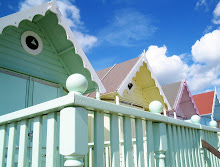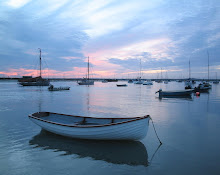 Front-page headline in today’s local paper: Mersea: Island’s status under threat
Front-page headline in today’s local paper: Mersea: Island’s status under threat Apparently, if a new nuclear power station is built on the site of the now decommissioned Bradwell – just across the Blackwater estuary from Mersea – then emergency evacuation requirements would mean that a bridge (or substantially raised road in place of the existing Strood) would have to be built, ‘meaning Mersea would, in effect, no longer be an island’.
Hmmm, well, as is so often the case with scary headlines in local papers, when one reads the article, there are an awful lot of speculative ifs and buts in this 'report'. Quite apart from the big debate about upping the country’s reliance on nuclear power (which I’m not going to go into here), the issue of bridges raises some fundamental questions for island-dwellers everywhere.
 Is it strictly true to say that Mersea would lose its ‘island status’ if it were permanently connected to the mainland? Has Skye stopped calling itself an island? Or Hayling Island? Both are now joined to the mainland by road bridges.
Is it strictly true to say that Mersea would lose its ‘island status’ if it were permanently connected to the mainland? Has Skye stopped calling itself an island? Or Hayling Island? Both are now joined to the mainland by road bridges.And, of course, we’re only talking about a few hours a day, a few days a month. When high tide isn’t around midday, the sea often doesn’t cover the Strood (which, incidentally, you can view, live, on Stroodcam - though do bear in mind that it’s dark here between around 5 pm and 6 am GMT!). In which case, Mersea, arguably, isn’t a 'real' island for much of the time anyway (though see my previous post on this question).
So what difference would a bridge make, apart from alleviating the periodic inconvenience of being stuck on the wrong side of the causeway because one’s forgotten to check the tide tables? Or having to call on the Essex Air Ambulance in case of emergency (we have our own Police and Fire Stations) when we’re cut off from the mainland?
A huge difference, actually.
There is much to be said for living by the tides. In this 24/7 culture of ours, where we can do pretty much anything at any time, go anywhere the moment the spirit take us, live life on a whim if we choose, there is something strangely reassuring about being forced to organise our lives, not in accordance with a timetable dictated by ourselves, our employers, shop opening times, or any other 21st century constraints, but rather in tune to the rhythm of the moon.
For those of us who don’t earn our livings from the sea, this daily reminder of the tide’s vast power, its profound impact on the shaping of the British Isles (watch a few episodes of Coast if you are in any doubt!) . . . well, it can help to keep life centred, in proportion. It’s quite profound, really.
Not all Mersea Islanders feel like this – there’s a substantial number who would heartily welcome a bridge, and the sooner the better, in their view. But for the rest – both incomers like me and those who can trace their roots here down countless generations – it’s a prospect that fills us with deep dismay. I sincerely hope it will never happen.
Not all Mersea Islanders feel like this – there’s a substantial number who would heartily welcome a bridge, and the sooner the better, in their view. But for the rest – both incomers like me and those who can trace their roots here down countless generations – it’s a prospect that fills us with deep dismay. I sincerely hope it will never happen.
Here's West Mersea at sundown today - complete with splashing labrador and the more distant sound of several thousand birds noisily settling down for the night.





















3 comments:
I love islands, though unfortunately I've never lived on one. I can well imagine that the appeal is very deep-rooted, whether you are an incomer or not. Certainly, several very fine novels have been set on islands, so perhaps they have an inspirational quality too.
Have not driven to Mersea for a while which would seem silly as I am about ten mins away but I have always loved the feeling of being slightly cut off when I get there. Next time I come I will let you know!
We must have missed each other by about five minutes...
Post a Comment